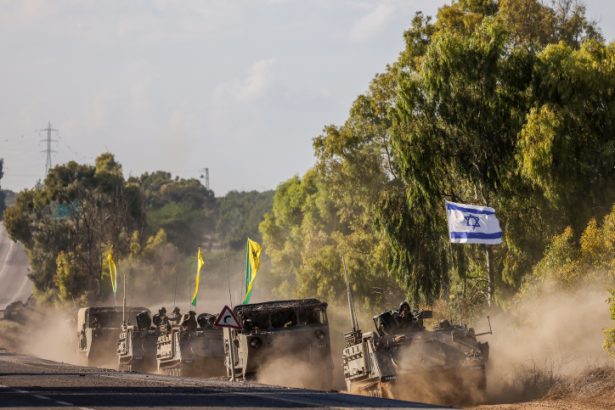Alan Johnson – @Fathom_Journal – and Jack Omer-Jackaman are editors of Fathom.
Israel is at war. A war whose aims we support. A war for its survival. Never has the old line that there are not separate wars in Israeli history – only the one, the War of Independence – been so true. The cause, this time? A pogrom of such vicious savagery as to make the mind boggle; an orgy of violence that will live alongside Kishinev, alongside Khmelnytsky – seared into the Jewish memory. That horrors like these were supposed to live in the Diaspora-past; that part of Zionism’s profound, inescapably compelling logic was that only in a Jewish State, guarded by Jewish might, could such murderous, such seemingly perpetual antisemitic violence be kept at bay; this is an integral part of the tragedy. Israel is reeling from its own unimagined vulnerability.
Israelis have long warned that in Hamas they face an enemy which would, given the chance and sufficient Israeli inattention, destroy them – humiliating, raping, and killing every last man, woman, and child in the land. Its friends abroad have tried, in vain, to bring home to a complacent Western public the unavoidable wisdom of such pessimism. In a sane world, Hamas, last weekend, would have put the doubt to bed. Its authentic face, known well by Israelis and acknowledged by their friends, was shown in all its deformed ugliness. 3,000 of its psychopaths tore through southern Israel killing and kidnapping all in sight. The term ‘indiscriminate’, used so inappropriately, so often, against Israel, was true here: any Israeli; any Jew. Babies, octogenarian Holocaust survivors, 250 largely peacenik youngsters engaged in collective joy? All slain and taken.
That Israel must respond – and not with the usual holding measures but with an operation targeted at the full destruction of Hamas – is not only justified but the duty of responsible government. The threat to Israel and her people is existential.
It is with caution that we recommend a particular military strategy to Israel – or in this case the abandoning of one. We are not Israelis; it was not our sons and daughters, our mothers and fathers, who were so brutally slain in Hamas’s barbaric pogrom of 7 October. Nor is it we who have lived with the reality of a genocidally-minded enemy at our border, raining down rockets on us whose impact is limited thanks only to Israeli bravery and Israeli ingenuity. We write from the safety of the United Kingdom and with the knowledge that ours is not the brutal neighbourhood that Israel’s is. We know that this war with Hamas, as with all wars inflicted on Israel, is a war the Jewish State cannot afford to lose.
Nonetheless, we urge against the continuation of the ‘complete siege’ of the Gaza Strip, announced on 9 October by Defence Minister Yoav Gallant in these terms: ‘No electricity, no food, no water, no gas — it’s all closed. We are fighting human animals, and we act accordingly.’
Such a siege is, we argue, wrong on three counts: wrong in principle, wrong for building international alliances, and wrong in terms of the battle for global public opinion.
WRONG IN PRINCIPLE
Just War Theory
Just war theory is a tradition of thinking about warfare stretching back to at least the 13th century. It not a mere academic theory but a body of reasoning about war used by militaries around the world, including Israel’s. It establishes the justice of a war, and directs war-fighting, by asking two kinds of question of it. First, was there a just reason for launching the war (jus ad bellum). Second, if so, was the war conducted justly (jus in bello).
The decision to wage war on Hamas and Palestinian Islamic Jihad after the 7 October pogrom is so patently just in the first sense that we do not argue the case here. But to use ‘total siege’ as a tactic in the conduct of that war (i.e. the conscious and organised denial of any humanitarian aid in the form of food, water, electricity or medical supplies to two million Gazans) is, we suggest, not.
The distinction between combatants and non-combatants, and the principle of non-combatant immunity, is central to just war thinking. Yes, some try to turn this into a code for pacifism, opposing all wars by observing that in war, especially modern war, some civilians inevitably die. They do, World War Two being an example. But the fact of unintended civilian deaths cannot decide whether a war is being conducted justly or not. Michael Walzer, the most important modern exponent of Just War theory, has criticised ‘the radicalism of people who do not expect to exercise power or use force, ever, and who are not prepared to make the kind of judgements that this exercise and use require’.
Just war thinking proper, argues Walzer, is ‘internal to the business of war’ (emphasis added). It directs us to questions of targeting, of warnings, of the distinction between combatants and non-combatants, and urges us to ‘attend closely to what soldiers try to do and what they try not to do’ and to ‘pay attention to strategic and tactical choices’ made by governments and armies. Just war theory is, he writes, ‘the doctrine of people who do expect to exercise power and use force’ but who nonetheless accept that they are responsible for the well-being first of all of their own people – think of Putin’s callous misuse of Russian troops – but also of ‘the well-being of innocent men and women on the other side’. Balances must be struck, even when waging war. Between being realistic about the defence of the country and recognising the humanity of the non-combatants on the other side. Between accepting that ‘there are things it is morally impermissible to do even to the enemy’ while fighting and knowing that fighting itself cannot just be, per se, ‘morally impermissible’ in the real world.
As a strategy and as a tactical choice, ‘total siege’, like indiscriminate bombing, does not distinguish, or distinguish enough, between combatants and non-combatants, and it ignores the principle of striving to ensure non-combatant immunity. Indeed, followed for any length of time the policy is guaranteed to lead to a huge number of civilian deaths. If the just war tradition tells us that fighting is not, per se, morally impermissible, ‘total siege’ surely is.
Just War theory, the siege, and Israeli obligation
Israel has long been relied on to deliver Gaza’s energy (some 50 per cent of it free of charge), and the argument that it should not be expected to continue when the Strip’s governing authority has just butchered 1350 Israelis is a powerful one. The laws of war certainly do not compel it to do so. The existing paradigm – that Gazan economic and structural stability is in the Israeli interest and thus to be pursued – has been blown away, possibly forever, and certainly for as long as Hamas is in situ.
At this moment, what obligation is it of Israel’s to provide the flow of humanitarian aid to Gaza? None. But it is not merely cessation but prevention that is being effected by the siege. The bombing of the Rafah Crossing prevents others from supplying vital aid. And people are being disingenuous in implying that all Israel is doing is ceasing its own supply. Gantz was clear: no supplies, from anywhere. So there is no escaping the fact that, while it is Hamas which has brought ruin on the Gazan people, it is an Israeli hand which will have closed the door on food, water, electricity, and medical supplies, and Israel which will be blamed for the death and misery which will inevitably follow.
Israeli support for corridors into Gaza for humanitarian aid and out of Gaza for civilians who are trying to leave would be right in principle, would help maintain international alliances and would help combat efforts to demonise Israel in global public opinion, essential if Israel is to retain the freedom of manoeuvre for long enough to defeat Hamas. Egypt has asked Israel to stop bombing the Rafah crossing, hit by hit by IAF airstrikes on Tuesday afternoon, so it can be reopened. The UN and other countries can fly humanitarian aid through the El-Arish airport in northern Sinai, located about 35 miles from the Rafah crossing, Egypt has said.
The argument that a siege is an essential, and therefore just, mechanism for the full defeat of Hamas is not compelling. The logic that says Hamas will baulk at the severity of the suffering of the Gazan people and so submit to the release of hostages, even to its own dissolution, is based on a profound cognitive dissonance. These are nihilistic barbarians, whose unconcern for their own people has been proven many times over.
A war on Hamas, not Gaza
In frequent public statements and media appearances by Israelis since the weekend, the message has been that Israel opposes not the Gazan people but the antisemitic murderers of Hamas and Palestinian Islamic Jihad. The same righteous case is made by Israel’s defenders here in the UK – that we seek the end of Hamas not only for the safety and security of Israel and Israelis but as a liberation of the Gazan people from a brutal and oppressive dictatorship. As Khalid Mahmood MP put it, ‘last weekend’s atrocities in Israel were the biggest massacre of Jews since the Holocaust. This is the logical outcome of Hamas’s supremacist ideology, which starts with violence against their own Palestinian Muslim population.’ It is true that Hamas was elected in a free election, by some 80 per cent of the Gazan population. But this was in 2006, when most present-day Gazans were not of voting age, and since when the population has had no further opportunity to exercise its rightful franchise.
It is also true that violent, frequently eliminationist, antisemitism extends well beyond the organised terror groups and is alarmingly popular within Palestinian society, both in Gaza and on the West Bank. We condemn it and recognise that peace is impossible with the Palestinians while such murderous hatred prevails. But it does not follow that therefore all Gazans deserve all they get. That proposition, however deep the well of rage and grief from which it understandably emerges, is wrong. The retort – so if Hamas does not speak for them, why do the Gazan people not rise up? – belies the iron grip of Hamas, PIJ et al on the Strip’s infrastructure and the immiseration to which they have led their people. It also cannot justly be applied to children.
While resolution in response to the nihilistic terror of Hamas is noble and necessary, extending that resolution to the denial of humanitarian aid to all Gazans is not.
We completely understand that many readers will be angered by talk of ‘principles’ and ‘just war’ while volunteers are still being drafted in to dig the graves of the 1350 Israelis murdered in the Hamas pogrom. But these are matters not only of principle but also of hard-headed strategic calculation in the war against Hamas. Israel’s capacity to fight and to defeat Hamas once and for all will be partly determined by Israel’s ability to retain a supportive international environment and global public opinion. The latter matters because in our 24/7 media and online world, a collapse of Israel’s position there may in time erode that international support, as publics pressure politicians.
WRONG DIPLOMATICALLY
Israel’s freedom to wage war on Hamas and PIJ is dependent upon maintaining the support of its allies. That support will be strengthened by the provision of humanitarian assistance to non-combatants in Gaza. It will be strengthened if, to take just this example, allies see that a Gazan women who needs an emergency caesarean to save her life and that of her baby can find a hospital with power, water, heat, medical supplies and doctors. Conversely, Israel’s support will be weakened – indeed one can hear words of warning from allies already, gently stated for now, but that could soon change – by 24/7 media coverage of the death of that woman and her baby.
As Walzer puts it, ‘there are now reasons of state for fighting justly’ (emphasis added). A moral regard for civilians at risk is now ‘crucially important in winning wider support for the war … for any modern war’ he argues, calling this ‘the usefulness of morality’.
President Biden this week made what many in Israel are dubbing the most Zionist speech ever delivered by an American President. It was, by any measure, an extraordinary act of Great Power diplomatic friendship. That Hezbollah has stayed relatively quiet so far doubtless owes much to Biden making crystal clear that any other terror organisations or states targeting Israel in its time of vulnerability will be made to pay a heavy price. He backed these tough words with the despatching of the USS Gerald Ford aircraft carrier, and the promise of the USS Dwight D. Eisenhower to follow if required. Secretary of State Blinken reinforced this reassuring solidarity in his visit to Israel on Thursday, as did Defence Secretary Lloyd Austin today – both affirming that as long as the US exists, Israel will not be required to defend herself alone.
Britain, too, has sent two Royal Navy ships – RFA Argus and RFA Lyme Bay – as well as surveillance aircraft, three Merlin helicopters, and Royal Marines to the eastern Mediterranean. Foreign Secretary James Cleverly on Wednesday became the first foreign minister to visit Israel after the pogrom, running for cover along with his hosts when the air raid sirens sounded in Ofakim. The Labour opposition, so recently a redoubt of anti-Israelism, has been similarly firm in backing the Jewish State.
But both Biden and Blinken, along with UK Prime Minister Sunak, have stressed that innocent Gazans should, as far as is practically possible, not pay the price for the sins of Hamas.
Biden, in this same steadfast speech, said: ‘Terrorists purposefully target civilians, kill them. We uphold the laws of war – the law of war. It matters. There’s a difference.’ Austin made sure to repeat these lines in his joint appearance with Gallant. They will not take kindly to the sight of Gazans dying in hospitals for lack of power and medicine, or to children dying of disease from the sewage now running through the streets since the pumps can no longer properly dispense with it. Nor should they; and Britain and other NATO allies will follow – not in abandoning Israel but in backing it with considerably less fervency. It has already begun: Sunak, in an otherwise supportive phone call with Netanyahu on Thursday 12th, reinforced to the Israeli prime minister that ‘it was important to take all possible measures to protect ordinary Palestinians and facilitate humanitarian aid.’ Other Tory MPs, as well as Labour shadow ministers, are following suit.
And what of the nations of the Abraham Accords, and other pragmatic (though often, it is true, deeply reactionary) Arab or Muslim states with whom Israel enjoys under-the-table but ever-improving ties? Will those hopeful, peaceful new bonds survive such a siege?
WRONG AS POLITICAL WARFARE
A ‘total siege’ is counterproductive in the war against Hamas for another reason. As Walzer has noted, ‘the media are omnipresent, and the whole world is watching’ in modern wars, so ‘war has to be different in these circumstances’. A policy of ‘total siege’ would mean that, very quickly, the only story being told by the world’s media will be the desperate plight of Gazan civilians. Indeed, as of late Friday, it almost is, certainly on social media. Those tempted to say ‘Well, to hell with the Hamas-apologists rallying in support of the pogrom, why should we care about what they say?’ are, we believe, missing the point. A humanitarian crisis in Gaza will mean opposition to Israel’s war against Hamas bleeds into the political mainstream, and from there to resolutions at the UN, and to private calls from US presidents to Israeli Prime Ministers to wind down the war against Hamas. The outcome of the media war is organically connected to the success or otherwise of alliance-maintenance. The freedom of manoeuvre Israel needs to defeat Hamas and PIJ depends on avoiding policies — such as ‘total siege’, but also bombing that can be seen as untargeted — that will isolate Israel diplomatically and in global public opinion.
CONCLUSION
We are in no doubt: Hamas must go. It is beyond reasonable human endurance for the grieving people of Israel — and of its Gazan periphery in particular — to live adjacent to Hamas after 7 October. And we recognise that achieving that necessary goal while adhering to the distinction between combatants and non-combatants is an agonising, strategically hideous challenge.
But as it proceeds in the coming weeks and possible months, Israel’s campaign against Hamas and PIJ will be more just and more effective if it is a just war justly conducted, and is seen to be such, a liberal democratic state fighting an antisemitic terrorist organisation, not the people of Gaza. This distinction must be rendered clear to all to strengthen international alliance and influence the direction of western public opinion, or what is salvageable of it from the wreckage of pervasive anti-Zionism and media complacency and disingenuousness. For all these reasons, we suggest, the policy of ‘total siege’ is both morally wrong and an obstacle to the real goal: the total defeat of the eliminationist antisemites of Hamas.



































